Alan Paul's Blog, page 7
August 24, 2018
RIP Ed King: The story behind his creation of “Sweet Home Alabama”

Photo by John Gellmann
RIP Ed King, the Lynyrd Skynyrd guitarist who wrote the riff that kicks off “Sweet Home Alabama,” one of the most enduring licks and songs in rock and roll history. He died at 68 at his home in Nashville. A statement on his Facebook page read, “It is with great sorrow we announce the passing of Ed King who died at his home in Nashville, Tennessee, on August 22nd, 2018,” the announcement reads. “We thank his many friends and fans for their love and support of Ed during his life and career.”
Band co-founder Gary Rossington confirmed the news on Twitter:
“I’ve just found out about Ed’s passing and I’m shocked and saddened,” he said. “Ed was our brother, and a great Songwriter and Guitar player. I know he will be reunited with the rest of the boys in Rock & Roll Heaven. Our thoughts and prayers are with Sharon and his family.”
Ed was the only non-Southerner in the band, a California native who wrote the song “Incense and Peppermints”for the Strawberry Alarm Clock when he was 17. He headed down South after falling in love with Duane Allman’s guitar.Strawberry Alarm Clock opened some early shows for Skynyrd and when bassist Leon Wilkeson freaked out and fled the band, they signed him up as bassist. When Leon returned, they slid Ed back to his natural instrument and the three-guitar army was born, with him standing alongside founding guitarists Gary Rossington and Allen Collins. Yep, Skynyrd having three guitarists was basically just a happy accident.
I wrote the story of “Sweet Home Alabama” for Guitar World a few years ago. RIP Ed.
“SWEET HOME ALABAMA”
Second Helping (MCA, 1974)
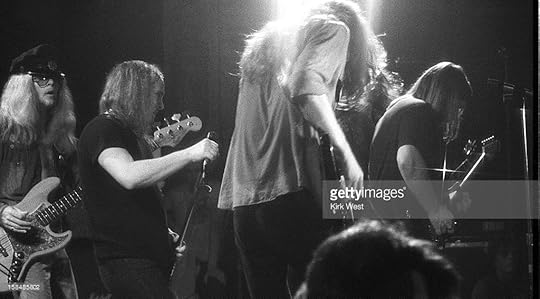
Skynyrd 74, Aragon Ballroom, Chicago. Foto – Kirk West
“I knew ‘Sweet Home Alabama’ was a classic the minute we wrote it,” says guitarist Ed King, who was primarily responsible for the song’s music, most notably its defining riff. Now get this: he wrote it on his first day as the band’s guitarist.
King had met Lynyrd Skynyrd when his band the Strawberry Alarm Clock opened for them. When bassist Leon Wilkeson abruptly left the band, they asked King to fill in. When Wilkeson returned, King slid over to Strat, their dual guitar lineup became a triple threat. Gary Rossington came up with a simple, evocative fingerpicked D, C, G progression – which he terms “the banjo/steel guitar part” – and feeling like he was onto something, kept playing it over and over.
“Gary had been playing his riff for 15 minutes when I walked in and threw mine in to bounce off of what Gary was doing,” recalls King. “That was what you know as the ‘Sweet Home’ riff, and when Ronnie heard it, he locked in and wrote the words.”
“He had all the lyrics within an hour,” says Rossington. “We used to travel through Alabama a lot and get onto back roads and just marvel at how pretty it was and how nice the people were. And Neil Young was, and still is, one our favorite artists, so when he came out with ‘Southern Man’ and ‘Alabama,’ criticizing the South, we said, ‘Well what does he know? He’s from Canada!’ So we threw that line about him in there. We were told by some people to take out the parts about Neil Young and [former Alabama governor] George Wallace, but we said, ‘Hey it’s just a song. And we’re going to record it the way we wrote it.’”
Adds King, “I wrote the choruses and everything up to Billy’s piano solo. It was a three-way collaboration as my part inspired Ronnie and I never would’ve been inspired to write my part without Gary’s contribution.
“Right after we wrote it, Ronnie said to me ‘Well? There’s our Ramblin Man.’”
August 8, 2018
10 Years Ago the Beijing Olympics started and I was in the middle of them
Wow, it’s been a decade!….
I was in the middle of the Beijing Olympics in a most profound way, writing the Destination Beijing blog for NBC.com. Sadly, the material is all long gone from the site, and I only saved a small amount of my work. Much of it is gone into
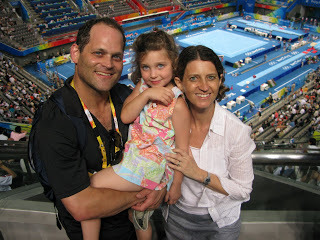
One event as spectators together with Anna – women’s gymnastics.
the digital ether.
Looking back through my blog takes me back to a hyperactive time. I certainly was busy, crisscrossing Beijing to cover the games, attend events, file back at the NBC office in the International Broadcast Center, run out to play high-priced black tie gigs like this, running over to appear on CCTV.
It was a really remarkable run, and a fitting culmination to our time in Beijing. As I wrote in Big in China, the Olympics dominated so much of our time there. They were such a huge, looming abstract presence that it felt almost surreal when they actually were under way. This Expat Life column captures that feeling quite well.
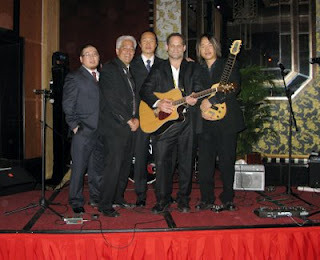
Black tie Woodie Alan – British Olympic Committee Ball. How did we pull this off?
One of the most remarkable moments came after I spent a long, exciting but exhausting night running all over the city covering the opening ceremony, starting at the gate of the Bird’s Nest, then working my way out, reporting in a live blog how the remarkable event was being viewed in Beijing itself. I dragged myself into the Broadcast Center at 8 am, because I was catching a bus to a shooting event, which would award the Games’ first gold medal. I walked in to see the live N
BC feed – the televised event was just beginning in the US. I watched for a while, almost believing it was live, despite my intense immersion the previous night. Then I turned away and almost bumped into Bob Costas, who was walking out of the studio after an all night work day. That all still spins my head a bit.
I still feel a bit guilty that we sent Jacob and Eli away during the Games – they came back here with my brother and spent two weeks with various relatives before my in-laws brought them back – though it was a reasonable, and probably correct, decision. Becky and I were both working ’round the clock at the games, with intense, erratic schedules. Anna stayed and played with friends, and we did manage to take her to one event together – women’s gymnastics. Here’s my report about that.
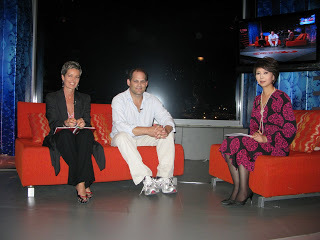
CCTV appearance
It was also amazing to be covering the Games along with Rebecca. We have always had parallel tack careers, doing very similar work (journalism) that never really intersected. To finally find ourselves covering something together was just fun; the fact that it was women’s weightlifting was just bizarre.
June 27, 2018
The night the Allman Brothers shut down the Fillmore East
In honor of the 47th anniversary of the Allman Brothers Band’s epic show that closed the Fillmore East down on June 27, 1971, I present the following brief excerpt from One Way Out: The Inside History of the Allman Brothers Band.
To read the full story and learn about the making of At Fillmore East, pick up a copy of One Way Out.
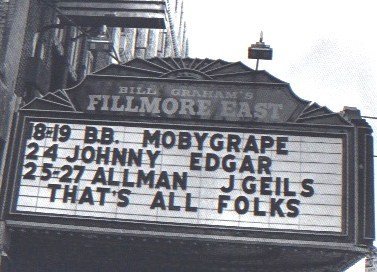
Just three months after the band recorded their double album At Fillmore East, and less than two weeks before its release, Bill Graham decided to close his landmark venue. He chose the Allman Brothers Band to headline three final nights, billed with the J. Geils Band and Albert King, and to be the theater’s final performers, at an invitation-only performance on June 27, 1971 that also featured special guests Edgar Winter, Mountain, Country Joe McDonald and the Beach Boys.
WILLIE PERKINS: Bill Graham never paid anyone top dollar at the Fillmore and a lot of bands went off to other promoters as a result and Bill would feel like they had turned their back on him. But we loved playing there. The guys hated most promoters, but they loved Bill.
GREGG ALLMAN: He closed the Fillmore with three nights and wanted us on all three, which I though was the kindest gesture and coolest thing.
BUTCH TRUCKS: The next-to-last night we played until the morning and we did things that
we had never thought of before or since. Those are the moments that have always made this thing work, the reason we’re still doing it and talking about it now.
ALLMAN: The second night we played up there for hours and hours, and walked out in the morning. The last night, everybody was already whipped from the night before. On one of the recordings we did, you can hear my brother saying, “It’s awfully quiet in here.” Everyone was burnt out.
TRUCKS: . We were just dumbstruck when we found out that we were gonna close the Fillmore. Can you think of a bigger honor at that time? Jesus. Everyone wanted in on that gig. The Beach Boys showed up and unloaded all their stuff and said they’d have to play last, and Bill Graham said, “Well, just pack up your shit. I have my closing band.”
So the Beach Boys had to swallow their pride.
Bill was never one to talk much when he introduced bands – “Ladies and Gentlemen, the Allman Bothers Band” – but that night he got up and read this speech about us and it was just incredible.

This is how Graham introduced the Allman Brothers Band for their – and the Fillmore E ast’s — final set: “The last few days, we have had the privilege of working with this particular group. And in the past year or so, we’ve had them on both coasts a number of times. And in all that time, I’ve never heard th
e kind of music that this group plays. And last night, we had the good fortune of having them get on stage at about two-thirty, three o’clock and they walk
ed out of here at seven o’clock in the morning and it’s not just that they just played quantity… for my amateur ears, in all my life I’ve never heard the kind of music that this group plays – the finest contemporary music. We’re going to round it off with the best of them all, the Allman Brothers Band.”
Excerpted from One Way Out: The Inside History of the Allman Brothers Band (St. Martin’s Press). Copyright 2014, Alan Paul. All rights reserved.
June 20, 2018
Exclusive Premiere: “Ain’t Wastin’ Time No More” From ABB Peach Picks

You can buy the album here.
THE ALLMAN BROTHERS BAND last week released Peach Picks: Cream of the Crop 2003
 , a collection of the best performances culled from six shows in July and August 2003. The collection includes 36 tracks recorded between July 25 and August 10, 2003 in Indianapolis, Pittsburgh, Darien Center, NY, Hartford, Charlotte and Raleigh, with no song repeated.
, a collection of the best performances culled from six shows in July and August 2003. The collection includes 36 tracks recorded between July 25 and August 10, 2003 in Indianapolis, Pittsburgh, Darien Center, NY, Hartford, Charlotte and Raleigh, with no song repeated.The 2003 iteration of the ALLMAN BROTHERS BAND–founding members GREGG ALLMAN, JAIMOE and BUTCH TRUCKS plus WARREN HAYNES, MARC QUINONES, OTEIL BURBRIDGE and DEREK TRUCKS–would prove to be the longest-running line-up and most consistent in its live performances. The band had just released their first album in 10 years, the Grammy-nominated Hittin’ The Note and were in top shape. Guest musicians on four Cream of the Crop 2003
 songs include Susan Tedeschi, Karl Denson and Branford Marsalis.
songs include Susan Tedeschi, Karl Denson and Branford Marsalis.I’m proud to premier “Ain’t Wastin’ Time No More” from Darien, NY right here. Enjoy.
June 17, 2018
Happy Father’s Day. Remembering a wild Great Wall hike with my dad
 Almost a decade after moving back from Beijing, I no longer think about my three and a half formative years in China on a daily basis. Repatriation is a long process and now the whole experience has been processed through my system and simply become a part of who I am. Every once in a while, however, some trigger re-immerses me in expat life.
Almost a decade after moving back from Beijing, I no longer think about my three and a half formative years in China on a daily basis. Repatriation is a long process and now the whole experience has been processed through my system and simply become a part of who I am. Every once in a while, however, some trigger re-immerses me in expat life.
This happened recently when I got onto my old desktop computer to load the hard drive onto a portable disc before some important files and treasured photos were lost to the digital mist. Great memories were stirred as I ripped through pictures of my family’s early days in China, marveling at how small my now-teen children were when we moved to Beijing in 2005: 2, 4 and 7 years old. Then I came across one image that stopped me in my tracks.
It showed my father and me standing on a spectacular stretch of wild Great Wall in Hebei province, about three hours Northwest of our Beijing house. This was in October 2006, early in our second year in Beijing and my parents’ visit was a special occasion. Just six months earlier my father, Dixie Doc, had undergone surgery to remove his cancerous bladder and construct a new one out of his small intestine.
Dixie had been diagnosed just months after we moved to Beijing, casting a pall over what had already been a transformative experience for my family. As most veteran expats know, being so far away from home as he went through his treatment was grueling, and my first visit back was an intense, melancholy affair. Surgery was looming and our best slice of quality time came when I accompanied him to a chemotherapy session. My father lacked his usual vigor and barely seemed able to enjoy time with my high-energy kids. As we hugged goodbye, it was impossible to suppress the thought that it could be for the last time.
A year later, there we were, hiking this gorgeous stretch of land 7,000 miles away, and standing together on this magical piece of history. Staring at the image, I recalled the entire crazy, memorable trip to get there. I had hired a guide who promised me an unforgettable hike, but had foolishly opted to drive myself, instead of hiring a driver, which I could have done for about $50. We slogged through Beijing traffic, then zipped up a large highway, before branching off to go up and over a twisty mountain pass.
At the bottom of the long hill, heading the other way, was one of the region’s infamous miles-long traffic jams. Large blues trucks, most of them loaded down with coal, stretched as far as the eye could see, waiting until they could enter the Beijing city limits at 10 pm. As we passed, I glanced over, fascinated by the army of drivers, some sleeping three abreast in their cabs, other stretching their legs, smoking cigarettes or playing cards with one another.
Squadrons of motorized bikes and tricylces scooted between the trucks, selling water, beer, tea, noodles and cigarettes. We drove by this fascinating scene for miles, contemplating a different route home, before the road became quiet and deserted. Eventually, we turned up a severely rutted dirt road with a sharp drop-off to our right. As I bounced along, struggling with the wheel, Dixie leaned forward and growled, “Where the hell are you taking us?”
This was not the first or last time he asked this question on this and other visits, as I was always intent showing important visitors the country I knew and loved, but this could be dangerous since off-the-beaten-path China could quickly become stuck-in-a-ditch or over-a-cliff China. Pushing those thoughts out of my head, we soon arrived at a small, mostly abandoned village, dying because a well had dried up and there was no water here.
A few dogs and chickens scurried around our feet as we started walking. It was a fairly short hike, probably less than two miles, most of it gently uphill. It was crabapple harvest season and we passed villagers picking and packing the little green and red fruits into wooden crates as well as a couple of donkeys grazing at the end of long tethers. It was windswept and wide-open land, pretty in a gentle, rolling way. Approaching the Wall, the terrain turned steeper and we headed uphill.
The relic itself was spectacular, the best-kept section of wild, unmaintained Great Wall I ever visited. The upper walls were gone, but the base was solid, the bricks perfectly spaced and symmetrical. Tall brittle grasses grew across the top, coming up to our chest in some places. “Wow,” my mother said, simply and accurately.
“Now I see where you were taking us,” my father said, as we stood looking out over the mountains stretching as far as the eye could see. A moment later my mother snapped the picture whose discovery years later triggered all these memories.
I wrote the award-winning The Expat Life column for WSJ.com from 2005-2009. This story is adapted from Big in China: My Unlikely Adventures Raising a Family, Playing the Blues, and Becoming a Star in Beijing (Harper). Copyright 2011 by Alan Paul.
June 13, 2018
The story of Texas Flood on the 35th anniversary of its release
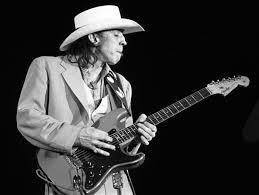
SRV, by Kirk West – www.kirkwestphotography.com
Today is the 35th anniversary of the release of Stevie Ray Vaughan and Double Trouble’sTexas Flood. To celebrate, I present the following story of the making of the album.
This was written for and originally published in Mojo circa 2001. A new version of the album was released five years ago and holds up really well: Texas Flood (30th Anniversary Collection).
I am deep into the process of a massive Stevie Ray Vaughan project, which I am working on with my good friend Andy Aledort and this is a great tease of what’s to come. I can not wait until I can share more details with you. Stay tuned!
*
When Stevie Ray Vaughan and Double Trouble were booked to play the 1982 Montreux Jazz Festival, it seemed that years of gigging and hard work had paid off. At last, the Texans who had spent years touring in a milk truck that leaked oil had gotten their break, becoming the first unsigned act to play the prestigious fest. It was a long way from the small clubs the trio played back home in Austin.
The booking came about thanks to the intervention of music industry big wig Jerry Wexler, who saw Vaughan and DT perform at a record release party for their former bandmate, singer Lou Ann Barton, and pledged to help. True to his word, Wexler had called his friend Claude Nobs, the Montreux promoter and helped secure them a slot. Vaughan and Double Trouble appeared on July 17, 1982, at the Montreux Casino amidst an evening of acoustic blues and the audience was less than impressed with their fiery, rocked-up show. Vaughan opened with Freddie King’s instrumental “Hide Away” and tore thorough staples-to-be like “Pride and Joy, “Texas Flood” and “Dirty Pool.”
Any blues fan today would give their eye’s tooth to witness this show. But the Montreux crowd, not expecting such a blistering assault on their evening and perhaps put off by Vaughan’s unabashed swagger and the simple fact that he was white, was les than enthusiastic. In fact, a good portion of the people present booed while the rest were oddly silent. The show can be seen in its entirety on the two-DVD set, Live At Montreux, 1982 & 1985 (which also includes the band’s triumphant return three years later, as superstars). Watching it now, it is impossible to fathom what the audience was thinking in their tepid-at-best reaction. It is not, however, hard to imagine the crushing disappointment Vaughan must have felt.
“Stevie was broken-hearted,” recalls bassist Tommy Shannon. “He turned around and said, ‘I don’t think we sounded that bad.’”
Adds drummer Chris Layton, “After the show we felt depressed and bewildered. We had come so far with such high expectations and the response was so bad.”
 Photographer Darryl Pitt recalls rushing backstage to console Vaughan, only to find him slumped on a small road case, looking like he had “been hit by a sledgehammer.” The dejection did not last long, however. The band was sitting glumly around its tiny dressing room when a Festival employee stopped by and said that David Bowie was in the house and wanted to meet them all.
Photographer Darryl Pitt recalls rushing backstage to console Vaughan, only to find him slumped on a small road case, looking like he had “been hit by a sledgehammer.” The dejection did not last long, however. The band was sitting glumly around its tiny dressing room when a Festival employee stopped by and said that David Bowie was in the house and wanted to meet them all.
“We sort of went, ‘David Bowie who?’” recalls Layton with a laugh. “And the guy said, ‘You know, David Bowie.’”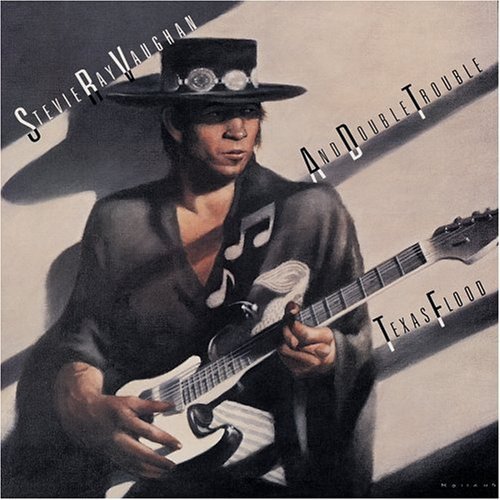
Vaughan, Layton and Shannon headed for the Musician’s Bar downstairs, where they hung out and chatted with Bowie for hours. Vaughan was, of course, delighted with the attentions of Bowie, who would soon proclaim the Texan the best urban blues player he’d ever heard and proclaim that no guitar player had juiced him up so much since he saw Jeff Beck in the early 60s at a London club. But Bowie, too, was pleased that the guitar firebrand was paying so much attention to him. On the heels of Low, Heroes and Scary Monsters, Bowie was regarded as a rather fringe artist in America at the time. So it was that when the rock star asked the unknown guitar stud whether he would be interested in doing some recording, the singer was just as pleasantly surprised that the guitarist said yes as the guitarist was that the offer was made.
“I expected and would have understood a polite ‘Thanks but no thanks,’” Bowie writes in the liner notes for the Montreux DVD. “You can’t imagine how delighted I was when he accepted the offer on the spot and said he’d love to try out a new kind of record just for the experience.”
The following night, Vaughan and company were booked to play the same hotel bar. Jackson Browne, who had performed at the Fest earlier that night was doing an interview in his hotel room when several members of his band barged in bubbling with excitement, insisting that whatever Browne was doing, he had to stop it and get down to the bar right now. Following his bandmates downstairs, Browne was similarly awed by what he witnessed and soon climbed on stage.
Recalls Layton. “We played all night, with Jackson and his whole band sitting in. We jammed until seven a.m., and at the end of the night Jackson said that he had a studio in L.A. and we were welcome any time we wanted to come record some tracks free of charge.”
Over the next six months, the meetings with Browne and Bowie would launch the career of Vaughan and Double Trouble and change the course of blues guitar, but that was far from clear when the band returned to Austin. They were poorer than a church mouse and their immediate prospects didn’t seem any more promising than they had for the past few years. Vaughan decided to take Browne up on his offer. The singer agreed to give the group 72 hours in Down Town over Thanksgiving weekend, and they quickly booked a short tour to help cover their travel expenses.
“We went in there, just hoping hoped that maybe we were making a demo that would actually be listened to by a real record company,” says Layton.
They were, in fact, recording their debut album, Texas Flood, though the circumstances hewed much more closely to their demo ideas.
“Down Town really was just a big warehouse with concrete floors and some rugs thrown down,” says Shannon. “We found a little corner, set up in a circle looking at and listening to each other and played like a live band.”
“We just rolled in there like it was a rehearsal or something and the guys working there were mildly annoyed because it was Thanksgiving weekend and they wanted to be home,” says Layton. “We were so unprepared, we were like, ‘Hey, uh, you guys got any tape?’”
The trio basically just ran through a typical live set of their strongest tunes over a few days.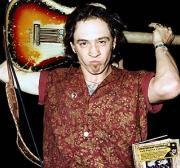
“That whole recording was just so pure; the whole experience couldn’t have been more innocent or naïve,” says Layton. “We were just playing. If we had known what was going to happen with it all, we might have screwed up. But we just went in there and did our live show. The magic was there and it came through on the tape.”
THE ORIGINAL “TEXAS FLOOD” BY LARRY DAVIS:
Vaughan’s hard-edged, vintage sound would soon turn the guitar world’s perception of tone on its head. At the time, rock music seemed eager to leave the past behind. Indeed, many thought guitars passé, with futurists proclaiming that the instrument would be permanently transformed by MIDI applications and replaced as rock’s dominant instrument by the synthesizer. Even many guitar loyalists thought the classic sounds were no longer adequate, transforming their instruments by running them through racks of elaborate, high-tech gear to create heavily processed sounds. Odd-shaped, brightly colored axes were all the rage.
Vaughan’s gear throughout his career was profoundly old school and never more so than on Texas Flood. Eventually, the tones he coaxed from his old but timeless gear would ignite a vintage craze that rages to this day and also launch a new market for small, high-end boutique amplifiers that replicated classic sounds with modern conveniences.
Following the recording sessions, the group stayed in LA to play several dates. On one of these nights, Layton was awakened at the Oakland Gardens Hotel by a three am phone call. “I answered in a fog and it was a guy with an English accent asking for Stevie,” Layton recalls. “I said that he was sleeping and asked who was calling. He goes, ‘It’s David Bowie and I’d like to speak to him now if possible. I got Stevie up and Bowie asked him if he wanted to come to New York and cut some tracks.”
Vaughan accepted the offer and flew to New York in the third week of December to join Bowie and producer Nile Rodgers at the Power Studio. Let’s Dance was complete except for lead guitar tracks. Vaughan’s performances, Bowie has said, “ripped up everything everyone thought about dance records.” Vaughan had casually become the linchpin in birthing a sound that Bowie had long heard in his head – a new kind of dance music that combined Euro sensibility with raw American blues power. Blown away, Bowie quickly asked Vaughan to join his touring band and the offer was accepted, though not without some real angst about leaving behind his own group.
“Stevie‘s plan was to do it for a year, take the money and pay us to keep the band together,” Shannon says.
As rehearsals continued in Dallas, then New York, Bowie and his band grew increasingly excited about the sound they were crafting around Vaughan’s blistering lead work and anticipation rose for bringing this heady brew around the world.. It was not to be, however.
What happened next is not entirely clear. Bowie says that as the band was literally loading onto a bus to go to the airport and fly to Europe and commence touring, Vaughan’s manager demanded a much higher salary or else the guitarist would not tour. The offer was promptly rejected, leaving the guitarist and his bags stranded on the sidewalk as the bus pulled away without him. Layton and Shannon have different recollections of the event. They say that Vaughan, already uncomfortable in a sideman’s role and upset that several promises about opening some shows himself were broken, finally snapped when told that he couldn’t mention his own band or music in interviews.
“He just couldn’t do it because it wasn’t what he loved playing,” Shannon says. “He liked David and his music, but it wasn’t where he was headed and Stevie could not do what he didn’t love.”
Urged on by Layton and Shannon, who were feeling increasingly desperate that their moment was passing, manager Chesley Millikin had been shopping the 10-song tape made at Browne’s studio and found an admirer in John Hammond. The septuagenarian A&R man, whose discoveries and signings included Billie Holliday, Bob Dylan and Bruce Springsteen, took the tapes to Epic and essentially demanded they sign him. Just like that, and with little other label interest, Vaughan quickly had a deal with Epic Records.
“Epic wanted to release our demo right away and we got more attention because people wanted to know who this unknown guy who told David Bowie to take a hike was,” says Layton.
The album was released on June 13, 1983. Texas Flood blew open the locked doors of popular music and proclaimed that blues could be a potent commercial force. The album, combined with the runaway success of Let’s Dance, not only put the unknown Texan on the map but also signaled that uncompromising guitar music was not dead as a commercial and artistic force.
Vaughan’s dramatic arrival helped smooth the way for the return of classic blues-oriented rock acts like the Allman Brothers, but it also made the environment more hospitable for his own peers, including The Fabulous Thunderbirds (featuring big brother Jimmie Vaughan), Robert Cray, and Los Lobos, all of whom had hits in the years following Texas Flood. Stevie also shone a bright spotlight back on his original heroes, most of whom had been languishing — overlooked and usually sans record deal. Albert King, Buddy Guy, Lonnie Mack, Hubert Sumlin, Otis Rush and Albert Collins suddenly found themselves once again being hailed as guitar titans, with interest in their music skyrocketing to levels unseen since the white rock audience’s initial discovery of blues in the 1960’s.
Certainly, as he himself pointed out, Vaughan owed a huge debt to these originators, but his music was not simply derivative; he hungrily swallowed his influences, fully digested them and crafted a style uniquely his own. In so doing, he succeeded where countless others had failed — reinventing the blues in a manner both visionary and true to the original material. It was a goal shared by every hippie with a Muddy Waters record but accomplished by precious few.
“Just when you thought there wasn’t any other way to make this stuff your own, he came along and blew that theory to bits,” says Bonnie Raitt. The word about Vaughan was out on the blues circuit for years, Raitt adds. Guy, King, Dr. John and others who passed through Austin had long been telling her about this kid who “was just killing it.” With the release of Texas Flood, the rest of the world got hipped as well.
June 12, 2018
Derek Trucks’ first interview as a member of the Allman Brothers – 1999
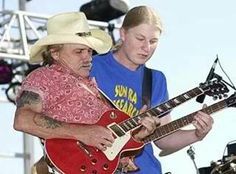
Derek Trucks made his debut with the Allman Brothers band on June 12, 1999 at Red Rocks. He had just turned 20. To honor the anniversary, I present this Guitar World Inquirer, which ran that month. I’m pretty sure it was the first interview with Derek as a member of the Allman Brothers Band, and he was asking me as many questions as I was asking him, which is only partly reflected here. This is a slightly expanded version of what ran. I had already been interviewing Derek for several years.
You are going to celebrate your 20th birthday by joining the Allman Brothers Band for their 30th anniversary tour. You are younger than any of them were when they started.
Really? I was wondering about that. Well, it’s an honor to be part of such a great institution. I’m just trying to maintain the spirit of the whole thing while hopefully bringing some fire to it. Hopefully I can hold up my end while also expressing my own voice. I’ve spent more time practicing since I got this call than ever. I usually listen to music for eight or ten hours a day, and just play for a few, because I’d rather hear the masters play than myself. But I’ve been spending a lot of time woodshedding, playing along with tapes and being awed by the level of musicianship –and the number of songs I have to learn. Luckily, I grew up hearing the music all the time, because, of course, Butch Trucks is my uncle and my dad played it constantly. My younger brother Duane is nine and he’s got the fever, too.
You have played with the band before, though, including two whole shows as a sub. That has to make it easier.
A little bit, but when I filled in for the two shows there wasn’t much expected because they called the day before and everyone understood I would be doing my best. Now it’s a different ballgame. I’m gonna be expected to know all of it. I need to get on the ball!
Did you know this was coming down the pike?
No. I was kind of surprised. I had heard something about it before – we had discussed it – but I wasn’t expecting this call. It’s definitely an honor.
For the older songs, are you going back to the originals, or to the recent versions with Jack Pearson and Warren Haynes?
I’m listening to tapes of everything, but I’m going to the source, which is Duane. I don’t want to do an interpretation of an interpretation. I love what Warren and Jack did, but I have to put my stamp on it. One of the hallmarks of the band is everybody gets their own voice. They don’t dictate what you play, but you have to hit the milestones and that’s good –I need some forced discipline. I’m just trying to keep the spirt of the whole thing going while hopefully bringing some fire to it. I’m just making sure I hold up my own end while expressing my own voice. There’s no way to do what Duane and everyone else did, and besides that was their thing and you want to let it stay there. You want to take from it without copying it.
Right. You’re replacing Jack Pearson, but you’re stepping into the Duane role.
Jack is a great player. I’ve been listening to a lot of tapes with him. He brought a whole different thing into the band, coming from a much more schooled, jazz thing. He and Oteil play great together and have really altered the sound and dynamics. It’s going to be exciting being on the road with Oteil, too. I was just talking to the Colenel about that.

Photo by Rick Diamond
Are you scared of standing on stage with Dickey Betts?
Not at all. I’m really looking forward to that. I’m listened to him forever, and it’s going to be a trip playing off of him and behind him. I’m hoping to learn a lot, because he is a master, especially writing-wise, which is an area where he excels and I need to work on.
Everybody but Warren Haynes who’s ever been in the Allman Brothers has gotten the mushroom tattoo. Are you going to do it?
I’ll see if I make it through the summer. If everything goes well, it will probably be part of the deal. Are you sure Warren didn’t get it? Nobody told me that.
Are you making any changes in your gear for the bigger stages and larger band?
I’ll probably have to step up a little. My Super Reverb is not gonna hang with Dickey’s Marshalls. I’m looking for late 60 Marshall head but haven’t found anything yet. I’m either going to play my SG or a Washburn which they are making me. I’m just going to see what feels better, especially tone wise. I think the vintage will end up being the choice.
What’s the status of your own band?
We are still touring and will keep doing so. The Brothers only play 40 dates a summer, so we should be able to do both and we worked really hard to get the band to the point where it’s really gelled, so we we’re not going to just drop it. It’s going to be tough at first because that’s a lot of time off and we stay together week by week, but we’re going to find a way to make it work because everyone’s out a lot into it and it feels like it’s really come together in the last six months. I can do both. Music is sort of all I do.
May 24, 2018
RIP Gregg: Gregg Allman Come & Go Blues Story and video
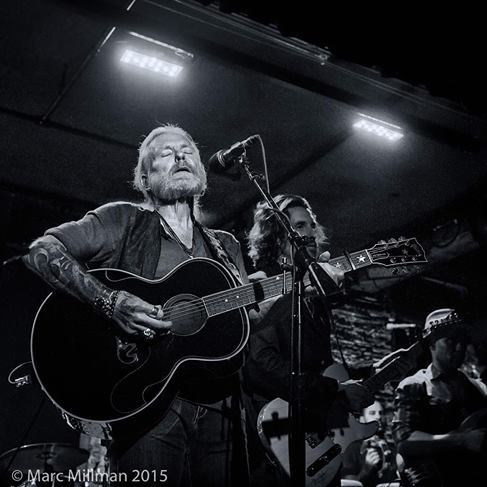
Photo – Marc Millman
In honor of the one year anniversary of Gregg Allman’s death… A couple of years ago, someone asked me to share a story about him that I had never told before, which got me thinking about this. Felt like a good time to share again. REST IN PEACE GREGG. You are horribly missed.
In 1997, I interviewed Gregg at 2 am in his Chicago hotel room after he played a solo gig at the Hard Rock Cafe – Jack Pearson was in the band. His wife Stacy and their two dogs were asleep behind us. It was a cover story for Guitar World Acoustic and I had brought an axe for him to demonstrate his finger-picked riff for “Come & Go Blues.” I handed it to him at the end of the interview, which had gone exceedingly well. It was the most relaxed, open conversation we ever had, by a long shot, which set the table for what came next.
He asked for a quarter and rounded off a couple of string ends. “You trying to take my eye?” he said with a laugh. Then he re-tuned the guitar, took out a pouch with fingerpicks, which he put on and showed me the riff.
Then he kept going and he played and sang all of “Come & Go Blues.” Audience of 1. It sounded just like you hear below. Happy birthday Gregg. I hope you are feeling better and healing up.
May 1, 2018
The amazing, insane totally true story of Col. Bruce Hampton’s death

Photo – Jess Burbridge
A year ago today, May 1, 2017, Col. Bruce Hampton died n in the most dramatic possible fashion during his 70th birthday party concert at the fabulous Fox Theatre in Atlanta. I wrote the following story for the Wall Street Journal and was pleasantly surprised to watch it be one of the most read and most shared stories on the WSJ site for days. I knew Bruce would have liked that. The whole thing is no less insane a year later.
I was pretty close to Bruce, so it was a gratifying but very difficult story to report and write. It was the second of three incredibly emotional interviews I did with Warren in just a few months, in between Butch Trucks and Gregg Allman’s deaths. Just typing that now still shakes me up!
If you want to read more:
My piece on why Bruce and the Aquarium Rescue Unit were so important is here.
And my personal tribute written in the shock of his death is here.
***
ORIGINALLY PUBLISHED IN THE WALL STREET JOURNAL:
Bruce Hampton may be the only person to have died at his own wake. The guitarist/singer/bandleader collapsed on stage of Atlanta’s Fox Theater on Monday, May 1, at the climax of Hampton70, a birthday celebration featuring dozens of his acolytes, including members of the Allman Brothers Band, the Rolling Stones, Phish, Widespread Panic, REM, Blues Traveler and Widespread Panic.
The sold out show concluded with over 30 musicians on stage smiling broadly as Hampton led them through Bobby Bland’s “Turn On Your Lovelight.” He pointed to 14-year-old Brandon Niederauer to solo, then went to one knee and collapsed. The band, thinking it was a theatrical end to a celebratory night, kept playing for several minutes before they stopped and EMTs rushed on stage to try and revive Hampton.

The final show – Sidney Smith photo
“It wasn’t the first time any of us had seen him on the floor like James Brown,” says Jeff Sipe, a drummer and longtime collaborator who was conducting the musicians. “It took a minute for concern to grow.”
Hampton, who had a heart attack in 2006, was rushed to Crawford Long hospital, just a few blocks from the venue. Sipe, Warren Haynes, Derek Trucks, Susan Tedeschi, Jimmy Herring and others were met there by a medical team who said that Hampton had suffered “a massive heart attack” and died at the venue, noting that nothing could have saved him.
“Everybody was devastated,” says Haynes, of Gov’t Mule and formerly the Allman Brothers Band. “It was one of the most epic nights of music anyone on stage or in the audience has ever experienced. To go from honoring Bruce in this amazing way to mourning him in the blink of an eye was emotionally jarring.”

One Way Out Atlanta celebration, 2014
The crowd of 5,000 chanted “Bruuuuuce” throughout the night. Hampton performed a 20-minute set at the start then joined in occasionally, mostly watching from a chair on stage. Performers ranged across generations, from the 14-year-old Niederauer, the star of Broadway’s School of Rock, to 88-year-old pianist Johnny Knapp, who recorded with Billie Holiday.
“Right before he went down, he looked me in the eye and smiled,” says Sipe. “He did the same thing to a few others. In retrospect it feels like he was saying good bye.”
The man who called himself Col. Bruce Hampton (ret.) was also an actor, appearing in 1996’s Sling Blade and the recent Here Comes Rusty with Fred Willard and as a voice in the long-running cartoon show Space Ghost Coast to Coast. He was a fixture of the Atlanta music scene since his experimental Hampton Grease Band earned him the moniker “the Frank Zappa of the South” in the late 60s. Hampton’s influence and revered place in the jam band universe stemmed from the Aquarium Rescue Unit, who performed from 1988-1993. They were akin to the Velvet Underground – a group which never sold much but had tremendous influence on others, notably Phish, Blues Traveler, Widespread Panic, and the Dave Matthews Band. ARU members Sipe, Oteil Burbridge and Jimmy Herring have gone on to play with the Allman Brothers, the Dead, Dead and Co and many others. Derek Trucks gigged with Hampton often and attributes his success as a musician and a person to the inspiration and guidance he received.

Photo – Derek McCabe
Hampton was the subject of a documentary, “Basically Frightened,” named after one of his best-loved songs.
“’Basically Frightened is a very ironic title, because Bruce was absolutely fearless,” says pianist Chuck Leavell, of the Allman Brothers and Rolling Stones, who knew Hampton for over 40 years and performed Monday. “He taught the rest of us to be musically fearless, that going places you’re nervous about will make you a better musician and a better person.”
Widespread Panic’s John Bell adds that an overwhelming sense of good will enveloped everyone at the birthday concert, including the man of honor.
“There was an incredible feeling in the building that was family reunion as much as concert,” says Bell. “Everyone rose to the occasion, including Bruce, who was playing and singing as well as I’ve ever seen him. He was in command until the last second and it was glorious to see. I believe he went from fully present in this world to fully present in another world, with very little in the middle.”
The amazing, insane totally true story of how Col. Bruce Hampton’s death

Photo – Jess Burbridge
A year ago today, May 1, 2017, Col. Bruce Hampton died n in the most dramatic possible fashion during his 70th birthday party concert at the fabulous Fox Theatre in Atlanta. I wrote the following story for the Wall Street Journal and was pleasantly surprised to watch it be one of the most read and most shared stories on the WSJ site for days. I knew Bruce would have liked that. The whole thing is no less insane a year later.
I was pretty close to Bruce, so it was a gratifying but very difficult story to report and write. It was the second of three incredibly emotional interviews I did with Warren in just a few months, in between Butch Trucks and Gregg Allman’s deaths. Just typing that now still shakes me up!
If you want to read more:
My piece on why Bruce and the Aquarium Rescue Unit were so important is here.
And my personal tribute written in the shock of his death is here.
***
ORIGINALLY PUBLISHED IN THE WALL STREET JOURNAL:
Bruce Hampton may be the only person to have died at his own wake. The guitarist/singer/bandleader collapsed on stage of Atlanta’s Fox Theater on Monday, May 1, at the climax of Hampton70, a birthday celebration featuring dozens of his acolytes, including members of the Allman Brothers Band, the Rolling Stones, Phish, Widespread Panic, REM, Blues Traveler and Widespread Panic.
The sold out show concluded with over 30 musicians on stage smiling broadly as Hampton led them through Bobby Bland’s “Turn On Your Lovelight.” He pointed to 14-year-old Brandon Niederauer to solo, then went to one knee and collapsed. The band, thinking it was a theatrical end to a celebratory night, kept playing for several minutes before they stopped and EMTs rushed on stage to try and revive Hampton.

The final show – Sidney Smith photo
“It wasn’t the first time any of us had seen him on the floor like James Brown,” says Jeff Sipe, a drummer and longtime collaborator who was conducting the musicians. “It took a minute for concern to grow.”
Hampton, who had a heart attack in 2006, was rushed to Crawford Long hospital, just a few blocks from the venue. Sipe, Warren Haynes, Derek Trucks, Susan Tedeschi, Jimmy Herring and others were met there by a medical team who said that Hampton had suffered “a massive heart attack” and died at the venue, noting that nothing could have saved him.
“Everybody was devastated,” says Haynes, of Gov’t Mule and formerly the Allman Brothers Band. “It was one of the most epic nights of music anyone on stage or in the audience has ever experienced. To go from honoring Bruce in this amazing way to mourning him in the blink of an eye was emotionally jarring.”

One Way Out Atlanta celebration, 2014
The crowd of 5,000 chanted “Bruuuuuce” throughout the night. Hampton performed a 20-minute set at the start then joined in occasionally, mostly watching from a chair on stage. Performers ranged across generations, from the 14-year-old Niederauer, the star of Broadway’s School of Rock, to 88-year-old pianist Johnny Knapp, who recorded with Billie Holiday.
“Right before he went down, he looked me in the eye and smiled,” says Sipe. “He did the same thing to a few others. In retrospect it feels like he was saying good bye.”
The man who called himself Col. Bruce Hampton (ret.) was also an actor, appearing in 1996’s Sling Blade and the recent Here Comes Rusty with Fred Willard and as a voice in the long-running cartoon show Space Ghost Coast to Coast. He was a fixture of the Atlanta music scene since his experimental Hampton Grease Band earned him the moniker “the Frank Zappa of the South” in the late 60s. Hampton’s influence and revered place in the jam band universe stemmed from the Aquarium Rescue Unit, who performed from 1988-1993. They were akin to the Velvet Underground – a group which never sold much but had tremendous influence on others, notably Phish, Blues Traveler, Widespread Panic, and the Dave Matthews Band. ARU members Sipe, Oteil Burbridge and Jimmy Herring have gone on to play with the Allman Brothers, the Dead, Dead and Co and many others. Derek Trucks gigged with Hampton often and attributes his success as a musician and a person to the inspiration and guidance he received.

Photo – Derek McCabe
Hampton was the subject of a documentary, “Basically Frightened,” named after one of his best-loved songs.
“’Basically Frightened is a very ironic title, because Bruce was absolutely fearless,” says pianist Chuck Leavell, of the Allman Brothers and Rolling Stones, who knew Hampton for over 40 years and performed Monday. “He taught the rest of us to be musically fearless, that going places you’re nervous about will make you a better musician and a better person.”
Widespread Panic’s John Bell adds that an overwhelming sense of good will enveloped everyone at the birthday concert, including the man of honor.
“There was an incredible feeling in the building that was family reunion as much as concert,” says Bell. “Everyone rose to the occasion, including Bruce, who was playing and singing as well as I’ve ever seen him. He was in command until the last second and it was glorious to see. I believe he went from fully present in this world to fully present in another world, with very little in the middle.”



